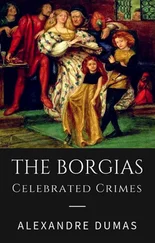— CHAPTER 14 — Cesare’s French Bride
‘THE MOST CONTENTED MAN IN THE WORLD’
CESARE’S RECEPTION AT MARSEILLES was suitably boisterous. Welcomed by the roar of cannons, the royal guests were met by four hundred archers who marched forward to escort the visitors to the quarters reserved for them. They spent almost a week in the city, enjoying the entertainments on offer, feasting at several banquets, and being shown such sights as the place had to offer.
Leaving Marseilles at the end of October, Cesare and his entourage started the long journey north to the French court, which was currently in residence in Chinon, some twenty-five miles southwest of Tours, where the divorce commission was still deliberating Louis XII’s divorce. At Avignon they were the guests of the papal legate — this was none other than Cardinal Giuliano della Rovere, who would, as Pope Julius II, later cause such terrible trouble for Cesare. For now, outwardly at least, they were on amicable terms, particularly since Alexander VI was relying on the cardinal to assist with negotiations at the French court in return for the pope’s help in restoring the della Rovere family to their former position of influence in Rome.
As a demonstration of this alliance, uneasy though it was, between Alexander VI and Giuliano, the legate had ridden two miles out of Avignon to meet Cesare and escort him into the city. ‘Avignon never witnessed such an enthusiastic welcome,’ wrote a witness of the scene. ‘Nor in the city had there ever been a more splendid procession.’ He was greeted with fountains gushing wine, presented with valuable pieces of silver plate, and ‘fêted by ladies and beautiful girls in whom the said Cesare takes much pleasure, knowing well how to dance and entertain them, the dances being morrisses, mummeries and other frivolities.’
Unfortunately, Cesare was in no mood to enjoy the festivities. Once again he was suffering from a recurrence of his venereal disease. So, indeed, was Giuliano: ‘Della Rovere has fallen sick again of that illness of his,’ one informant told Ludovico Sforza. ‘Now the flowers [as the syphilitic rashes were euphemistically known] are starting to bloom again; if God does not help him, he will never be quite healthy. Also they say publicly of Cesare that he too has the malady of St Lazarus in his face and, moreover, he is in a discontented frame of mind.’
From Avignon Cesare travelled up the Rhône valley to Valence, the capital of his duchy, and then on to Lyons, where he arrived on November 7. From Lyons he dawdled, taking every opportunity to delay his arrival at the French court until the divorce commission had declared its verdict. Crowds gathered in every town to watch him pass by; as the son of a pope, he was an object of considerable curiosity. His entourage was led by a parade of sumpter mules, each bearing the Borgia crest and followed by two more mules carrying huge chests, the contents of which became a lively subject of debate among the crowds of onlookers. After these came the gentlemen of Cesare’s household, their horses caparisoned with immense cockades and silver bridles, followed by twenty pages dressed in red velvet and cloth-of-gold, by young noblemen of Rome and Spain, and by his personal bodyguard of Spanish mercenaries. Cesare himself rode past imperiously, pearls and precious stones decorating his black velvet costume, his hat, and even his boots.
He did not create a good impression on his route north to Chinon. He was said to be aloof and arrogant, all too ready to take offence and to give it. To the French, his ostentatious retinue appeared absurdly pretentious for a twenty-three-year-old youth who was not only illegitimate but was also unable to claim one drop of royal blood. His impassive manner was viewed as haughty; on occasion he was even insolent, as when, at a reception at Valence, Louis XII’s representative came forward with the collar of the Order of St Michael and would have placed it around his neck, but Cesare pushed it away, saying that it was for the king himself to bestow.
Finally, on December 17, the cardinal of Luxembourg announced that the divorce commission had found in Louis XII’s favour, freeing him from what he himself described as this ‘cripple, afflicted with scrofula, repellent in person and mind.’ The divorced wife, by her own admission not a beauty, had remained dignified throughout the proceedings; she retired to a convent, founded her own order of nuns, and was canonized in 1950.
The following day Cesare made his formal entry into Chinon, crossing the bridge over the Vienne with the great medieval castle, stronghold of the Plantagenet kingdom in France, looming mightily over the town. He was accompanied by Georges d’Amboise, whose red hat was in the duke’s baggage, along with the papal dispensation that would allow Louis XII to marry Anne of Brittany. A man who was there gave a description of the occasion:
The Duke of Valence entered thus on Wednesday, the eighteenth day of December 1498… preceded by twenty-four handsome mules carrying trunks, coffers and chests, covered with cloths bearing the Duke’s arms, then again come another twenty-four mules with their trappings halved in red and yellow… Then twelve mules with coverings of yellow striped satin. Then came six mules with trappings of cloth-of-gold… And after came sixteen beautiful great chargers, led by grooms, covered in cloth-of-gold, crimson and yellow… after these came eighteen pages, each one on a fine charger, of whom sixteen were dressed in crimson velvet, the two others in cloth-of-gold… Then came six fine mules richly equipped with saddles, bridles and trappings in crimson velvet, accompanied by grooms dressed in the same. Then two mules carrying coffers and all covered in cloth-of-gold… Then after came thirty noblemen clad in cloth-of-gold and silver, followed by three musicians, two tambours and one rebec, dressed in cloth-of-gold according to the style of their country, and their rebecs had strings of gold. They marched between the gentlemen and the Duke of Valence, playing all the while. Then came four musicians with trumpets and clarions of silver, richly dressed, playing their instruments without ceasing. There were also twenty-four lackeys all clad in crimson velvet halved with yellow silk, and they were all around the Duke; beside him rode [Georges d’Amboise], conversing with him.
As to the Duke, he was mounted on a great tall horse very richly harnessed, with a covering of red satin, halved with cloth-of-gold and embroidered with very rich gems and large pearls. In his cap were two double rows of five or six rubies, as large as a big bean, which gave out a great light. On the brim of his cap there were also a great quantity of jewels, even to his boots, which were all adorned with chains of gold and edged with pearls.
Cesare rode through the town of Chinon, glittering with jewels and the finest clothes. From the castle windows high above, the king and his courtiers watched the procession and were exceedingly entertained by what they considered the ‘vanity and ridiculous pomposity of this duke.’ On entering the château, Cesare made ‘a profound reverence to the ground to His Majesty,’ reported the Venetian ambassador, ‘then, half way across the great hall, he made another reverence, and then, coming up to the King, he made as if to kiss his foot, but the King prevented this, so he kissed his hand instead, as did the gentlemen of his suite.’ And after dinner Cesare was escorted to the royal apartments, where he remained with the king ‘to the fourth hour of the night,’ and the following day Louis XII entertained Cesare in the company of several fashionable ladies. Indeed, despite his earlier ridicule, the king was clearly deeply impressed with this extraordinary youngman, who could be so agreeable when he chose to be so, especially when flattered by royalty.
Читать дальше











